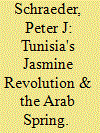| Srl | Item |
| 1 |
ID:
179842


|
|
|
|
|
| Summary/Abstract |
This article explores the intellectual puzzle of whether the domestic political instability associated with the Arab Spring is responsible for a surge in global terrorism that peaked in 2014. A series of negative binomial regressions demonstrate strong support for an “escalation effect”: more severe forms of domestic political instability, most notably government purges and riots, breed greater levels of terrorism, although the most severe form of domestic political instability—revolution—does not. We also find that specific types of domestic political instability affect terrorism levels differently depending on geographical region and regime type (i.e., democracy versus dictatorship).
|
|
|
|
|
|
|
|
|
|
|
|
|
|
|
|
| 2 |
ID:
019226


|
|
|
|
|
| Publication |
April 2001.
|
| Description |
213-228
|
| Summary/Abstract |
Although most observers have focused on the domestic impacts of South Africa's transition to democracy, most notably the dismantlement of its apartheid political system, this process has also entailed the transformation of South African foreign policy. As former President Nelson Mandela aptly explained in Foreign Affairs several months prior to victory in the presidential and legislative elections of 1994, he considered the charting of a new foreign policy as a 'key element' in the creation of a 'peaceful and prosperous' South Africa. The primary purpose of this article is to offer an assessment of the foreign policy adaptation strategies adopted by the Mandela and Mbeki administrations in their quest to further strengthen South Africa's ongoing transformation from an isolated international pariah to leader of the African renaissance. An initial section outlines five strategies designed to adapt South African foreign policy to the new realities of the post-apartheid era: restoring civilian control over the security apparatus; restructuring the foreign policy establishment; self promotion as the leader of the 'African renaissance'; adherence to the foreign policy principle of 'universality'; and assuming a leadership rôle in international organizations. Section two explores how the process of democratization has favoured the reemergence and strengthening of the rôles played by a wide variety of state and non-state actors within the foreign policymaking process. A final section sets out five issues that will continue to set the tone of debates over South African foreign policy well into the first decade of the new millennium. An important conclusion of the article is that although the case study of South Africa in many respects constitutes a microcosm of the foreign policy challenges confronting other African countries, it also offers insights into the foreign policy adaptation strategies pursued by emerging powers in other regions of the world.
|
|
|
|
|
|
|
|
|
|
|
|
|
|
|
|
| 3 |
ID:
118307


|
|
|
|
|
| Publication |
2012.
|
| Summary/Abstract |
Tunisia's Jasmine revolution and the Arab Spring are unfolding amidst the resurgence of five sets of debates over the proper role of the international community in democracy promotion efforts abroad, including in the Middle East and North Africa, which were once thought to be impervious to democratic change. These debates, which are explored here within the context of the Arab Spring, range from the normative question of whether the international community should be actively involved in democracy promotion efforts abroad, to what forms of intervention should constitute part of the global arsenal for those intent on seeking democracy's spread. A final section reflects on whether international efforts will contribute to the further strengthening of the Arab Spring or a return to an Arab Winter of authoritarianism.
|
|
|
|
|
|
|
|
|
|
|
|
|
|
|
|